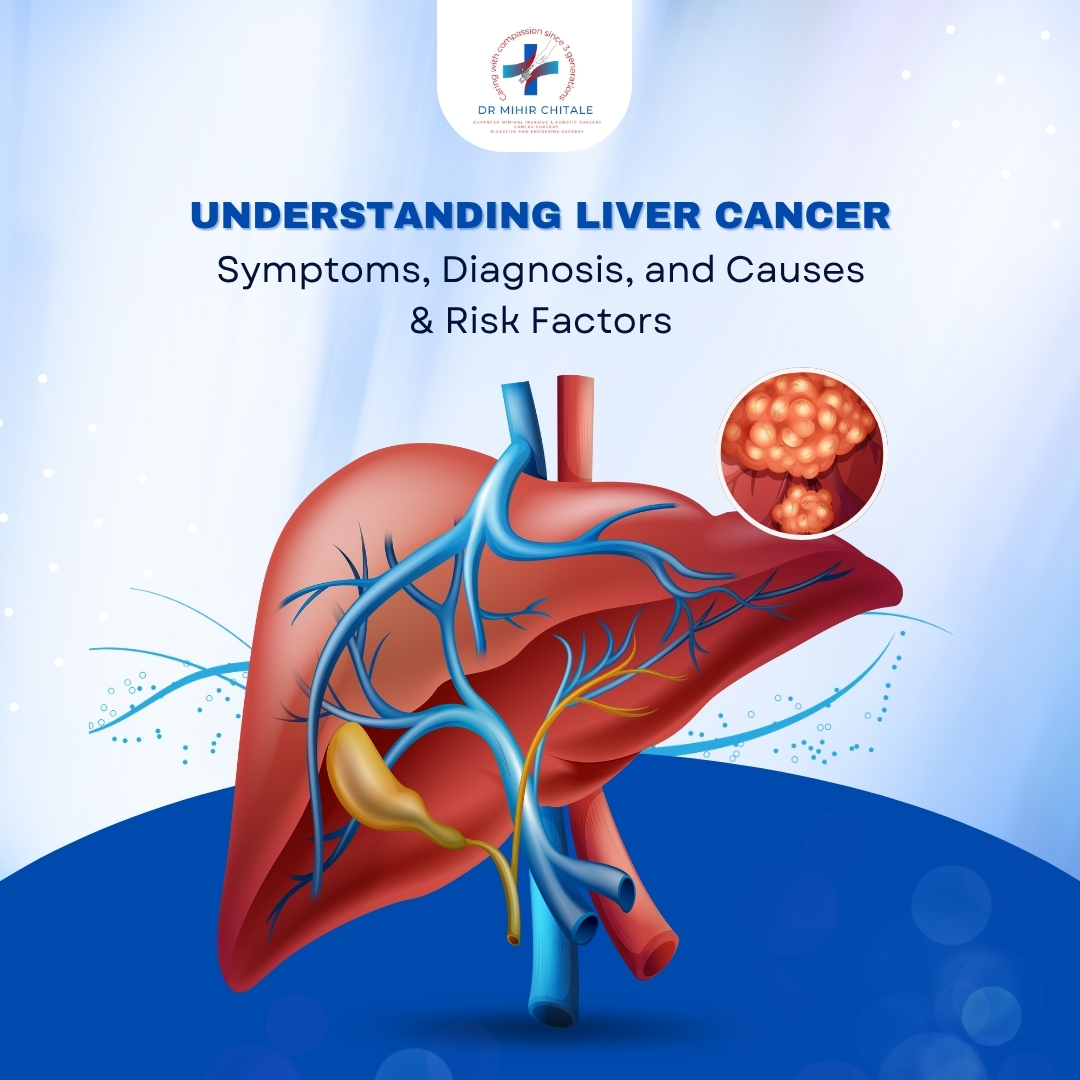
Understanding Liver Cancer: Symptoms, Diagnosis, and Causes & Risk Factors
Liver cancer is a serious condition that affects thousands of people worldwide. Often, it develops silently, with symptoms appearing only in later stages. Early detection can significantly improve treatment success and survival rates. In this blog, we will explore what liver cancer is, its symptoms, and the importance of timely medical attention.
What is Liver Cancer?
Liver cancer occurs when abnormal cells in the liver multiply uncontrollably, forming a tumor. It can either start in the liver (primary liver cancer) or spread from other parts of the body (secondary or metastatic liver cancer). The most common type of primary liver cancer is Hepatocellular Carcinoma (HCC), which arises from liver cells (hepatocytes). Other types include cholangiocarcinoma (bile duct cancer) and angiosarcoma (a rare liver cancer affecting blood vessels).
Liver cancer is often associated with chronic liver diseases such as hepatitis B, hepatitis C, cirrhosis, and non-alcoholic fatty liver disease (NAFLD). Lifestyle factors like excessive alcohol consumption, obesity, and exposure to harmful toxins can also increase the risk.
Symptoms of Liver Cancer
In its early stages, liver cancer may not cause noticeable symptoms. However, as the disease progresses, the following signs may appear:
- Unexplained weight loss
- Loss of appetite & persistent nausea
- Upper right abdominal pain or discomfort
- Jaundice (yellowing of the skin and eyes)
- Dark urine & pale-colored stools
- Persistent fatigue and weakness

Additional Signs and Symptoms Include:
Liver cancer often develops silently in its early stages, making it crucial to recognize the warning signs before it progresses. While common symptoms like jaundice, weight loss, and fatigue are widely known, there are additional signs that may indicate liver cancer.
- Swelling in the abdomen (Ascites): Fluid buildup in the belly due to liver dysfunction.
- Itchy Skin: Caused by bile duct obstruction.
- Feeling full quickly: Even after eating small amounts of food.
- Unexplained fever or night sweats.
- Easy bruising or bleeding: Due to impaired liver function.
Causes & Risk Factors of Liver Cancer
Liver cancer is linked to various risk factors, including:
- Chronic Hepatitis B or C Infections – Long-term viral infections can cause liver damage.
- Cirrhosis – Scarring of the liver due to alcohol abuse, fatty liver disease, or hepatitis.
- Non-Alcoholic Fatty Liver Disease (NAFLD) – Fat buildup in the liver, often linked to obesity and diabetes.
- Heavy Alcohol Consumption – Excessive alcohol intake increases the risk of liver disease.
- Aflatoxin Exposure – Consuming food contaminated with mold toxins can contribute to liver cancer.
- Genetic & Family History – A family history of liver cancer can increase susceptibility.

Is Liver Cancer Curable if Caught Early?
Yes, early detection plays a crucial role in improving survival rates. If liver cancer is diagnosed in its early stages, treatment options include:
- Surgical Resection: Removing the cancerous part of the liver.
- Liver Transplant: Replacing the damaged liver with a healthy donor liver.
- Ablation Therapy: Destroying cancer cells using heat (radiofrequency ablation) or cold (cryotherapy).
- Targeted Therapy & Immunotherapy: Using medications to attack cancer cells and boost the immune system.
Regular liver function tests, imaging scans, and screenings for high-risk individuals can help detect liver cancer at an early stage when treatment is most effective.
What Do People Feel When They Have Liver Cancer?
Liver cancer often progresses silently, making it difficult to detect in its early stages. However, as the disease advances, individuals may experience various physical and emotional symptoms. Understanding these signs can help in seeking timely medical attention.
Also Read – Who Needs Endocrine Surgery & What Are The Risks & Benefits?
Is It a Sign of Cancer?
A sudden shift in bowel habits can be one of the earliest signs of colon cancer, yet it often goes unnoticed.
If you experience persistent changes in stool consistency, color, or movement, it’s essential to pay close attention, as these could be more than just minor digestive issues.
Other symptoms that may accompany bowel movement changes include:
- Unexpected leakage of feces, mucus, or gas
- Frequent urge to use the restroom
- Diarrhea or prolonged constipation
- Unusual stains or stool marks on undergarments
If you’re experiencing any of the symptoms mentioned above, schedule a check-up with a doctor.

